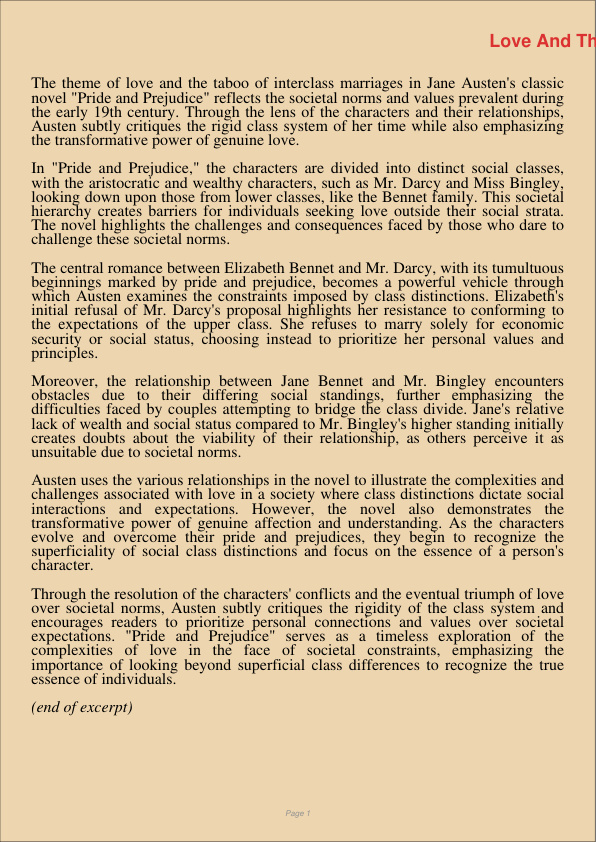Love And The Taboo Of Interclass Marriages In Pride And Prejudice A Novel By Jane Austen
Jan 9, 2024
jane austen
interclass marriages
Management
Environmental Studies
The theme of love and the taboo of interclass marriages in Jane Austen’s classic novel “Pride and Prejudice” reflects the societal norms and values prevalent during the early 19th century. Through the lens of the characters and their relationships, Austen subtly critiques the rigid class system of her time while also emphasizing the transformative power of genuine love.
In “Pride and Prejudice,” the characters are divided into distinct social classes, with the aristocratic and wealthy characters, such as Mr. Darcy and Miss Bingley, looking down upon those from lower classes, like the Bennet family. This societal hierarchy creates barriers for individuals seeking love outside their social strata. The novel highlights the challenges and consequences faced by those who dare to challenge these societal norms.
The central romance between Elizabeth Bennet and Mr. Darcy, with its tumultuous beginnings marked by pride and prejudice, becomes a powerful vehicle through which Austen examines the constraints imposed by class distinctions. Elizabeth’s initial refusal of Mr. Darcy’s proposal highlights her resistance to conforming to the expectations of the upper class. She refuses to marry solely for economic security or social status, choosing instead to prioritize her personal values and principles.
Moreover, the relationship between Jane Bennet and Mr. Bingley encounters obstacles due to their differing social standings, further emphasizing the difficulties faced by couples attempting to bridge the class divide. Jane’s relative lack of wealth and social status compared to Mr. Bingley’s higher standing initially creates doubts about the viability of their relationship, as others perceive it as unsuitable due to societal norms.
Austen uses the various relationships in the novel to illustrate the complexities and challenges associated with love in a society where class distinctions dictate social interactions and expectations. However, the novel also demonstrates the transformative power of genuine affection and understanding. As the characters evolve and overcome their pride and prejudices, they begin to recognize the superficiality of social class distinctions and focus on the essence of a person’s character.
Through the resolution of the characters’ conflicts and the eventual triumph of love over societal norms, Austen subtly critiques the rigidity of the class system and encourages readers to prioritize personal connections and values over societal expectations. “Pride and Prejudice” serves as a timeless exploration of the complexities of love in the face of societal constraints, emphasizing the importance of looking beyond superficial class differences to recognize the true essence of individuals.
